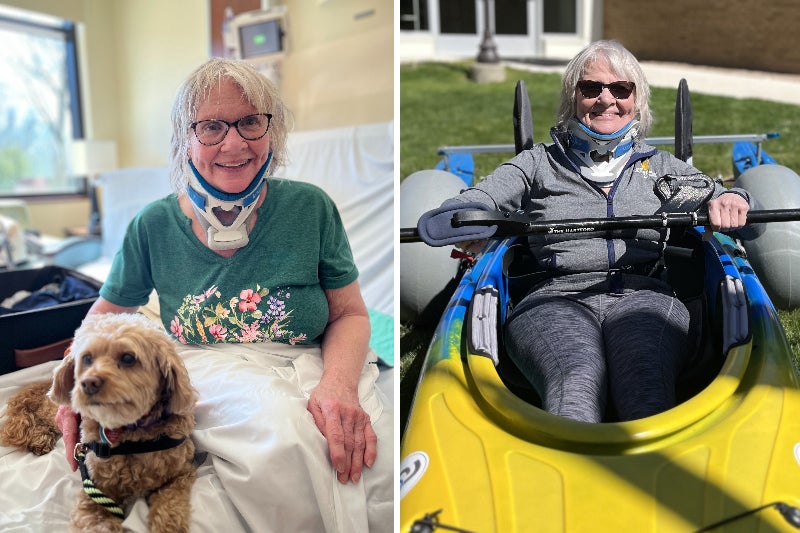Sue's Care Journey at Inpatient Rehabilitation at Chelsea Hospital
October 14, 2025
Sue was a working 67-year-old, looking forward to retirement. She and her husband were renovating a retirement home in Gaylord, Michigan.
One day, while her husband was away, Sue simply wanted to take out the recycling. On her way, she fell down a few steps into her garage and hit her head. Sue was able to get herself inside her home, but then fell a second time, hitting her head again.
Unconscious, Sue lay on the ground inside her home for over 30 hours before her husband returned from their home in northern Michigan. Sue suffered a traumatic brain injury (TBI) and a subdural hematoma. She spent two weeks in the hospital, undergoing multiple scans, as well as a craniotomy.
During her recovery, Sue slowly started to regain her cognitive ability and memory. She says it took over a year to truly feel like herself again.
Throughout recovery, Sue experienced ongoing balance problems. Doctors diagnosed her with cervical spinal stenosis and myelopathy. These conditions happen when the spinal cord in the neck gets compressed. Doctors recommended neck surgery.
Just before her scheduled surgery, Sue had another fall, this time while cleaning. She slipped and fractured her arm, delaying surgery. Despite the delay, Sue had successful neck surgery mid-April 2025 at University of Michigan Health.
“Needless to say, I’m a bionic woman now,” she laughed. “I have a plate in my arm and a plate in my neck. Through all this I said, ‘I’m going to get the right rehab here.’”
The Choice for Sue's Rehabilitation
Sue knew right away where she wanted to go for her rehabilitation: Inpatient Rehabilitation at Chelsea Hospital.
“I told everyone: I want to go to Chelsea. I want it in my record ‘Sue wants to go to Chelsea.’ That’s where I want to be. It didn’t matter. I just knew I had to be in the right place.”
After arriving at Chelsea Hospital, Sue’s journey was far from easy. The pain was overwhelming at times, but she says the staff was always kind and caring, which motivated her to keep going.
“I was feeling so bad at first, I didn’t want to go to therapy. Instead of my occupational therapist saying, ‘You’re out of here, because that’s why you came here!’ She said, ‘What do you want to do?’ and we did a meditation together. They were so accommodating and non-judgmental of where you’re at.”
Whether it was a virtual or in person visit, Sue shared that her U-M Health Physical Medicine and Rehabilitation physicians always checked in on her. “It was really important that they listened to me, and I felt heard. Because of that, I felt like I could do this. I could get better.”
Every part of her stay, from spiritual care to physical therapy, was important for her healing.
Sue recalled her connection to the room service staff fondly. “I couldn’t eat much at first, so I always ate raspberry sherbet and vanilla ice cream. One time, when I didn’t order it, they sent a tray with it anyway. They knew what I needed. A little thing like that spoke volumes.”
Sue stayed at Chelsea Hospital until May 2, 2025, and left with renewed strength and confidence. “It was like a home away from home. I wanted to stay there forever,” she said.
When Sue left the hospital, she used a walker and a cane, showing improvement from the wheelchair she had when she arrived. Sue was able to stand on her own – something she couldn’t do initially.
As Sue continues her recovery at home, she has grown stronger since that first fall. She is active and back spending time with her husband, even driving herself now.
Back at Chelsea: Giving Back
“I told everyone at Chelsea Hospital, I’m not coming back as a patient! But I will see you again.” Sue is a part of the new University of Michigan Hospital peer mentor program for those with a spinal cord injury.
Sue connects with patients and helps them feel less alone on their own road to recovery.
“It’s the least I can do to give back as a small way to say thanks for getting my life back on track,” Sue shared.
If you or a loved one is looking for inpatient rehabilitation care, start with Inpatient Rehabilitation at Chelsea Hospital.




